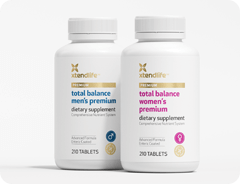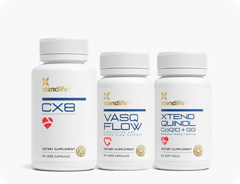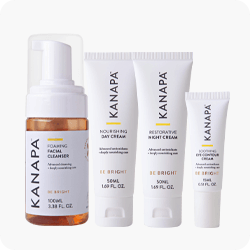When it comes to skin health, a diet rich in antioxidants is widely praised for its anti-aging benefits. Antioxidants can be taken in supplement form or can exist in skincare.
What are antioxidants?
First, it is important to define antioxidants. Despite the fact you get to hear or read a lot about them, the chances are high you have not come across an article or even a podcast wherein a person explained what an antioxidant really is.
Antioxidants are phytochemicals, vitamins, and minerals that protect our cells from free radical damage. These substances can occur naturally in plants, fruits, vegetables, teas, and so on, but they can also be manmade.
Do all antioxidants work similarly?
Although antioxidants have a common goal to protect the cells from free radical damage, they are not equal. These substances are present in every cell and organ in your body. That said, different antioxidants work in different parts of the cell or in different organs. Therefore, it is impossible to claim that all antioxidants work the same way or that you need one antioxidant more than others to stay healthy. Just like our body needs a variety of nutrients to stay healthy, it also needs a spectrum of antioxidants.
We can compare antioxidants to the players in a football team, each with their own role. For instance, fat-soluble coenzyme Q10 and Vitamin E protect the fatty cell membrane and the mitochondria. Water-based glutathione and Vitamin C protect the nucleus. Lycopene is resistant to breakdown caused by the heat, unlike water-soluble antioxidants, which is why it is more available to the body.
The take home message here is that although antioxidants have the same goal, every member of this family has its own unique role. The antioxidants benefits for skin are, by far, the most well-known effects of these substances. But how does prevention of damage caused by free radicals benefit our skin health?
How does reducing free radical damage support skin health?
Free radicals form from normal processes in the human body, or they are a result of some environmental factors such as exposure to X-rays, ozone, air pollutants, cigarette smoking, and industrial chemicals. Some internal factors include:
- Exercise
- Inflammation
- Xanthine oxidase
While some external factors include:
- Certain drugs, pesticides
- Cigarette smoke
- Environmental pollutants
- Industrial solvents
- Ozone
- Radiation
The antioxidant anti-aging role is to destroy free radicals and reduce the damage they cause to skin health (as well as many other benefits).
Basically, besides reducing free radical damage, antioxidants also work by improving the ability of your skin and DNA to repair itself to stay healthy and youthful.
Antioxidants in skin care
Benefits of antioxidants in skin care are confirmed in numerous studies. For instance, it has been shown that free radicals contribute to a breakdown of collagen, and the main culprit of free radicals is, you guessed it - exposure to harmful UV rays. In fact, about 80% of signs of aging on someone’s skin are a result from long-term exposure to the sun without protection. However, oral intake of antioxidants can help support against this damage. Also, to experience greater benefits it is necessary to consume different skin antioxidants so they can work simultaneously to provide a synergistic effect.
Different antioxidants counteract these effects, but you are probably wondering which ones are the best for your skin.
Anti-aging antioxidants
Vitamin E
This antioxidant is present in the skin and found in various fruits and vegetables, meaning it is easy to obtain it through diet. Vitamin E supports collagen production and reduces the appearance of signs of aging. Bear in mind that Vitamin E supplements are not as effective as topical treatments. Therefore, get the recommended daily value of Vitamin E through diet and use topical products containing this micronutrient, rather than buying Vitamin E supplement.
Vitamin C
Vitamin C is usually associated with reduced appearance of signs of aging, but it also calms and hydrates the skin. Nowadays, most anti-aging products contain this vitamin and you can easily get it through a well-balanced diet.
Resveratrol
This is an antioxidant that interrupts and helps fend off negative environmental influences. Resveratrol also brightens up a person’s complexion and evens out the skin tone.

Lycopene
Unfortunately, this antioxidant is largely ignored and you will rarely see it in the list of best antioxidants for your skin. Lycopene is incredibly beneficial for improving skin texture due to the fact it promotes collagen production and reduces DNA damage that leads to fine lines and wrinkles.
To get the most out of this antioxidant, you should increase the intake of foods that contain it e.g. tomatoes, and you can also take supplements. For example, our anti-aging antioxidants supplements Omega 3 / DHA Plus and Omega 3 / QH Premium CoQ10 contain lycopene as well as astaxanthin. Why astaxanthin? Because it’s yet another frequently ignored antioxidant that is beneficial for your skin.
Astaxanthin
One of the greatest advantages of astaxanthin is that it never becomes pro-oxidant, meaning it does its job without any chance of “playing for the other team”. This antioxidant increases skin moisture as well as moisture retention, the elasticity of the skin. Also, astaxanthin promotes smoothness and makes the visible signs of aging less noticeable. Interestingly, the antioxidant has UV-blocking effects and it is more effective than Vitamin C in combating free radicals thanks to its ability to neutralize multiple free radicals at once. It could easily be considered as the best antioxidant for skin even though you have probably never heard of it before. Here is yet another benefit of astaxanthin, it supports healthy blood flow, meaning your skin gets much-needed nutrients easily.
Conclusion
Antioxidants are substances that reduce damage caused by free radicals or prevent it from occurring. They play a crucial role in our skin health and aging process. While nutrition is a great way to get these antioxidants, high-quality supplements have been proven to quality and health of a person’s skin as well. While vitamins C and E are widely mentioned in this context, lycopene and astaxanthin are two powerful antioxidants for skin that you should never ignore. Remember, instead of focusing on one specific antioxidant, you will experience greater benefits if you consume a well-balanced diet rich in different antioxidants or take supplements that provide them. They work together to keep your skin healthy.
References
- http://www.phytochemicals.info/antioxidants.php
- http://www.xtend-life.com/information/ingredients/astaxanthin
- /blogs/supplement-ingredients/lycopene
- https://www.ncbi.nlm.nih.gov/pmc/articles/PMC3249911/
- https://www.ncbi.nlm.nih.gov/pmc/articles/PMC3299230/
- http://www.xtend-life.com/skincare
- https://www.hindawi.com/journals/isrn/2013/930164/
- https://www.ncbi.nlm.nih.gov/pubmed/1450595
- http://www.xtend-life.com/supplements/omega-3/omega-3-dha-fish-oil-premium
- http://www.xtend-life.com/supplements/omega-3/omega-3-qh-ultra/ingredients


 Supplements
Supplements Bundles
Bundles









